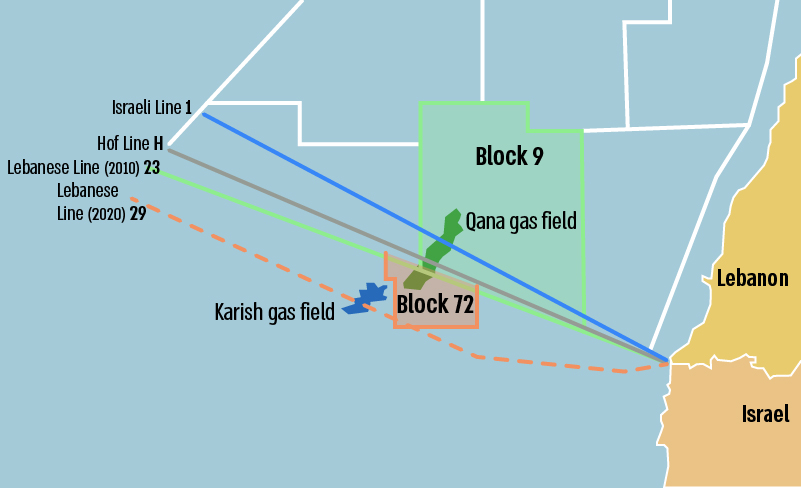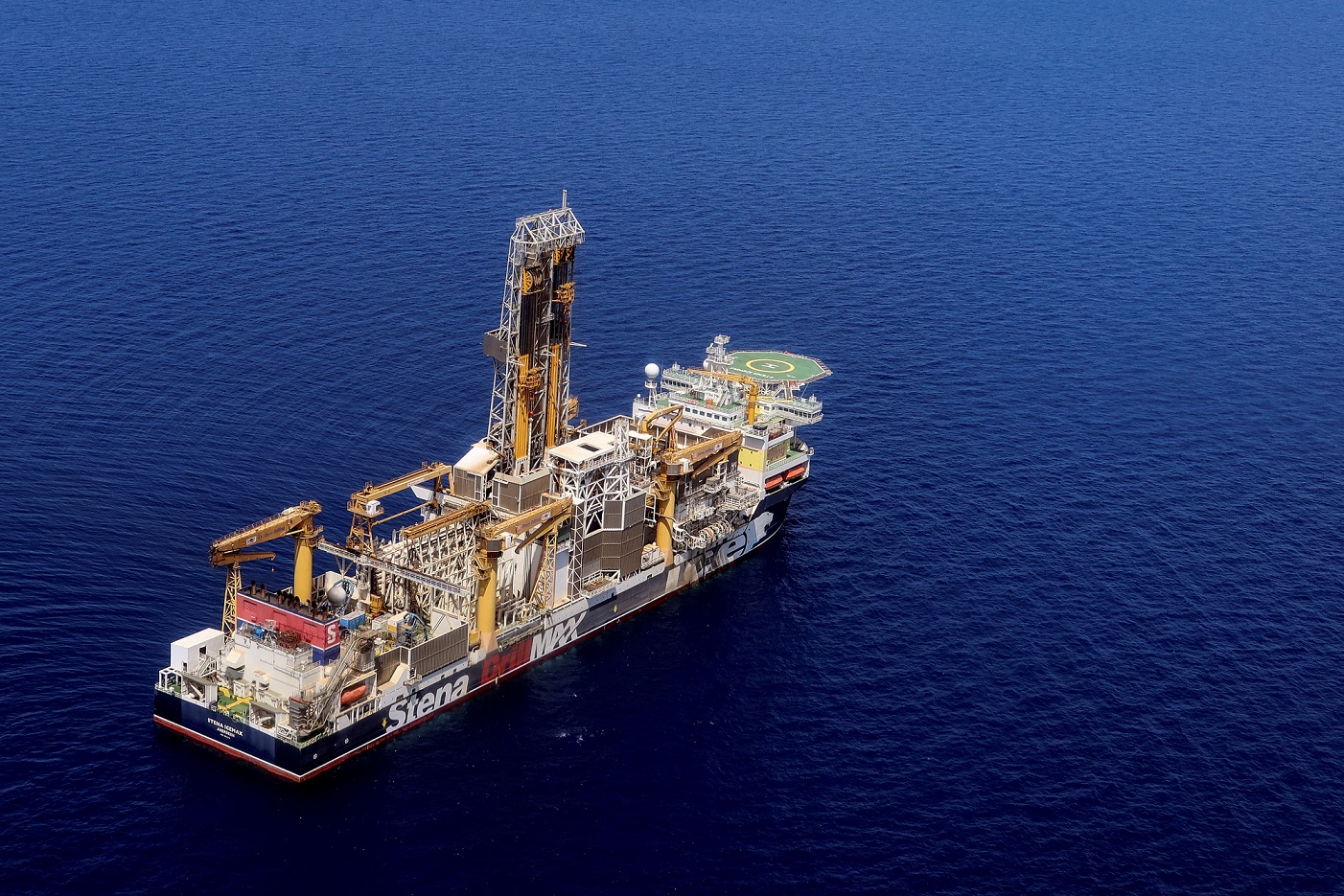Publications
INSS Insight No. 1618, July 14, 2022
The launch of UAVs by Hezbollah toward the Karish gas field was intended to convey a twofold message – to Israel and to the Lebanese – against the backdrop of Israel’s determination to continue production from this field and the renewed diplomatic effort initiated by Lebanon to resolve the maritime border dispute between the countries. Public opposition to Hezbollah’s action by senior Lebanese officials and the compromise proposal that Lebanon put forward indicate that unlike Hezbollah, Lebanon is eager to reach a compromise with Israel that can help extract it from its severe economic crisis. The current diplomatic effort appears more serious than previous ones, and Israel, for its own benefit, should work to see it through by taking further steps toward the Lebanese proposal and refraining from a military attack that at this stage would play into Hezbollah’s hands.
The arrival on June 5, 2022 of the British-Greek Energean gas rig in Israel’s territorial waters (some 80 kilometers from the Israeli coast), in preparation for gas production from the Karish field, deepened tension between Israel and Lebanon regarding their maritime border dispute, and was harshly criticized by actors from across the political spectrum in Lebanon. It was claimed that part of the Karish field is in Lebanese territory and that production from Karish, which is planned to begin in the last quarter of 2022, harms Lebanese interests. Hezbollah leader Hassan Nasrallah went a step further and claimed in a belligerent speech on June 9 that producing gas from the field is an act of aggression against Lebanon and an attempt to steal its natural resources, and threatened that Hezbollah has military, logistical, and intelligence capacities to prevent Israel from doing so. Nasrallah also claimed that this matter is no less important than liberation of the “security zone” in 2000, and that he personally has no fear of a confrontation with Israel, which in his words understands the organization’s capacity to cause it extremely severe harm.
This is the background to Hezbollah’s launch of four Iranian-made unarmed unmanned aerial vehicles (UAVs) toward Karish (one on June 29 and three on July 2), which were intercepted by Israel. This was a kinetic cognitive action aimed at impacting both Israel and various actors in Lebanon. Toward Israel the aim was primarily deterrence, by making a showing of determination to carry out Nasrallah’s threats in the future by military action that would try to create a new deterrence framework in the aerial and maritime arenas – even at the cost of escalation and the risk of a full-fledged conflict. In Lebanon the message was directed at rivals and at public opinion, with the aim of painting Hezbollah as “the defender of Lebanon,” particularly because at the moment there are increasingly prominent voices opposing Hezbollah’s continued independent military power and the organization’s participation in the new government that national leaders are working to form.

While the launch of the UAVs was praised by Lebanon’s Hezbollah supporters, it was condemned by its opponents and by other voices. The harsh public responses against this action by government leaders, who prefer the diplomatic track, were especially noteworthy. The joint statement by transitional Prime Minister Najib Mikati and Foreign Minister Abdallah Bou Habib noted that the action was carried out outside the framework of state responsibility and the diplomatic context, and was thus unacceptable and even endangered Lebanon. Bou Habib expressed support for the efforts led by American mediator Amos Hochstein to advance an agreement between Israel and Lebanon, demanded to accelerate negotiations, and stated that these might be finished by September. He implied that he expects Hezbollah to act responsibly and uphold previous statements that committed to support government decisions on this issue.
Hezbollah is opposed in principle to direct contacts with Israel, which could be interpreted as recognizing Israel or at least as opening the door to economic and political relations, but it could not obstruct entirely the negotiations between the countries underway intermittently for over a decade. The present urgency in renewing diplomatic contacts via American mediation, given Lebanon’s dire economic situation, puts Hezbollah in a complex position. It wants to use its influence and prevent any potential agreement that would include territorial-economic compromise or contain elements of normalization with Israel, but it risks being seen as acting against Lebanon’s interests and against the stance of the political leadership.
Hezbollah is particularly concerned about the significant change in Lebanon’s official stance in the dispute over the maritime border with Israel, which represents a concerted effort to return to the diplomatic track. In the wake of the arrival of the Karish rig, the Lebanese summoned the American mediator to Beirut, and in their meetings with him on June 13-14 presented a compromise proposal that reflects softer Lebanese demands than those formulated over the past two years. There are three key elements of the Lebanese proposal: 1) Lebanon will return to its stated stance from the past, which demands marking the border at the northern Line 23 (see map); 2) all profits from gas produced at the Qana field, which is in the area defined by Lebanon as within its exclusive economic zone [EEZ], but which in part dips below Line 23 into Israel’s zone will go to Lebanon; 3) until an agreement is reached, Israel will not produce gas from Karish. This stance was presented on June 24 by Hochstein to the Israeli side, but Israel has not yet made an official response.
At this stage it is not clear if Hezbollah intends to carry out its threat to attack the rig, in light of likely Israeli and international responses to such a move. In addition to the possibility of an Israeli military response and the potential for escalation, which would severely harm Lebanon’s interests when Lebanon is already in one of the worst crises it has ever faced, attacking a facility owned by Energean would further harm Hezbollah’s international status. After Nasrallah’s threats on June 9 the Greek Foreign Ministry summoned the Lebanese representative in Athens in protest.
Until two years ago, the Karish field was not included in Lebanon’s exclusive economic zone, even according to the official stance of the Lebanese government. The following are a list of key developments in the mediation between Israel and Lebanon on this issue:
- In the first round of negotiations (2010-2012) between Israel and Lebanon on demarcation of the maritime border, conducted with American mediator Frederic Hof, Lebanon’s official stance put the maritime border with Israel at Line 23. This stance left a gap of 860 square kilometers between this line and the line of the Israeli official stance (point 1), which was at the heart of the dispute between the two countries. Line 23 was also given credence as the official stance of Lebanon as presented in letters to the United Nations in 2010-2011. Hof’s efforts came to naught as a result of Lebanon’s unwillingness to accept the compromise proposal he put forth that Israel accepted, whereby the disputed area would be divided between Lebanon (55 percent) and Israel (45 percent).
- Another round of negotiations was held in late 2020, this time in Naqoura, sponsored by the UN. In this round Lebanon toughened its stance and presented a new line further south (Line 29), which added an additional 1430 square kilometers to the territory in dispute and included a small part of the Karish field.
- The process of approving Line 29 as the official stance of Lebanon – as insisted on by Hezbollah – has not been completed and has no legal standing. Its final approval by the Lebanese government was frozen by President Michel Aoun, who prevented it from being brought to the Parliament for approval. The toughening of the Lebanese stance, which reflects this internal dispute, led to the cessation of talks in 2020.
- The Americans tried again in November 2021 and sent senior government energy adviser Amos Hochstein to mediate between the sides. After a number of consultations in Jerusalem and Beirut, Hochstein did not achieve any progress,
Israel is determined to move ahead with producing gas from the Karish field, given that this field lies in its EEZ, and even the Lebanese government’s compromise proposal hints at this. The interception of the UAVS by the IDF far from the rig demonstrates Israel’s ability to defend the rig and thwart attempts to attack it. Hezbollah’s choice of moves that could lead to a military conflict with Israel puts the organization in a problematic situation as an entity acting against Lebanon’s interests and preventing its attempt to secure a source of income, at a time when there are international efforts to help it do so.
The recent incidents around the gas rig ended with Israel having the upper hand militarily and on the cognitive level. The successful interception and Hezbollah’s subsequent announcement that the UAVs were on a “reconnaissance mission” do not obligate Israel to retaliate militarily, and in fact such a move could actually serve Hezbollah’s interests and torpedo current diplomatic efforts to reach a compromise, which appear more serious than in the past. Accordingly, it is important that Israel work to exhaust the diplomatic process and even consider economic concessions to Lebanon, in the spirit of the Lebanese proposal conveyed by Hochstein, because of the economic and strategic advantages an agreement would likely confer.
Israel also has kinetic and cognitive possibilities that are more limited than warfare, which it can use to make clear to Hezbollah that its attempts to challenge Israeli military and naval superiority via offensive measures in these spheres will be met with a military response. It is important for Israel to emphasize the negative role played by Hezbollah, which prevents a solution that could assist Lebanon financially and risks the security of its citizens without consulting relevant Lebanese authorities.This could encourage deeper domestic criticism of Hezbollah.
In conclusion, given that the launch of unarmed UAVs did not cause kinetic harm to Israel, an offensive military response can be avoided, and diplomatic measures should be prioritized, in order to serve Israel financially and regionally and in its relations with the US. At the same time, preparations should be made for circumstances that would necessitate military action against Hezbollah, if the organization misunderstands Israel’s restrained response and challenges it again, thereby violating the current balance of deterrence.



